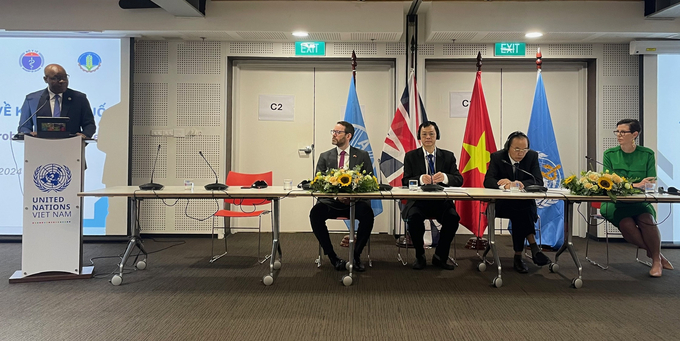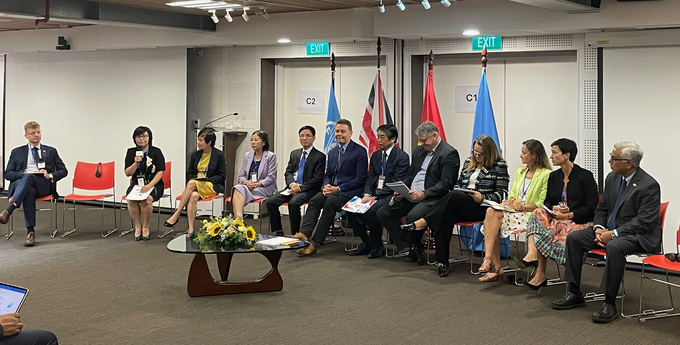The High-Level Roundtable on Antimicrobial Resistance calls on farmers to use the ‘right drug’ for the ‘right disease’ and use the ‘right dose’ only when absolutely necessary.
 Antibiotic resistance is a threat to health and the economy, requiring the joint efforts of individuals and sectors in Vietnam to combat this situation. Photo: FAO.
Antibiotic resistance is a threat to health and the economy, requiring the joint efforts of individuals and sectors in Vietnam to combat this situation. Photo: FAO.
The High-Level Roundtable on Antimicrobial Resistance, co-organized by the British Embassy in Hanoi, FAO and WHO in Hanoi on 29 August, highlighted the seriousness of the problem of antimicrobial resistance.
Antimicrobial resistance occurs when bacteria, viruses, fungi and parasites become increasingly resistant to drugs, making infections difficult to treat. Antimicrobial resistance spreads rapidly through many environments such as health facilities, animals, food, soil and water. This situation increases the risk of disease spread, worsening, causing disability and death, and antimicrobial resistance is one of the greatest threats to public health and global development.
Addressing antibiotic resistance requires collaboration between the health, animal and environmental sectors, including policymakers, health care facilities, the private sector, farmers and individuals.
Deputy Minister of Agriculture and Rural Development Phung Duc Tien stressed the need to support Vietnam in implementing the National Action Plan on Antimicrobial Resistance in Agriculture, and called on farmers to use the “right medicine” for the “right disease” and the “right dosage” when absolutely necessary.
“We have implemented the Action Plan for Antimicrobial Resistance in Agriculture since 2017. Since then, many regulations have been issued or amended to reduce the use of antibiotics in the agricultural sector. It is important that the Government at all levels from central to local and the community support the implementation of these regulations and the implementation of the National Action Plan. Every Vietnamese citizen, whether or not involved in the agricultural sector, can support by using the right medicine for the right disease at the right dosage according to regulations,” said Deputy Minister Phung Duc Tien.
Deputy Minister Phung Duc Tien emphasized that even though important milestones have been achieved since the development of the National Action Plan in 2013, we still face many challenges in preventing and controlling the increasing trend of antibiotic resistance in the health sector.
Deputy Minister of Health Nguyen Tri Thuc called on Vietnamese people to join hands to prevent antibiotic resistance. According to Deputy Minister Thuc, although Vietnam has made certain progress in preventing antibiotic resistance, the situation still faces many difficulties. To solve this problem, there needs to be close coordination between the health sector and the agriculture, animal, plant and environmental sectors.
Therefore, the Government has issued a national action plan for the health sector for the period 2024-2025 to accelerate the implementation of the strategy to prevent antibiotic resistance. Deputy Minister Thuc proposed the joint efforts of all relevant parties, from health workers to the people, to jointly achieve the goal of preventing antibiotic resistance.

The World Health Organization (WHO) Representative in Vietnam highly appreciated Vietnam’s National Strategy on Antimicrobial Resistance. He emphasized that antimicrobial resistance not only affects human health but also causes serious economic and social consequences. Therefore, action is needed now to combat resistance.
Actions to prevent antimicrobial resistance include improving access to clean water, sanitation and hygiene (WASH) for humans and animals, and strengthening disease prevention and control in households, health facilities, farms and food industry.
Improve access to vaccines, diagnostics and medicines, reduce contamination and ensure proper waste management and sanitation, and raise public awareness and knowledge about the use and misuse of antibiotics.
Dr. Nono Womdim, Chief Representative of the Food and Agriculture Organization of the United Nations (FAO), highlighted the importance of the upcoming high-level meeting on antimicrobial resistance at the United Nations General Assembly on 26 September.
The conference is expected to develop sustainable solutions to combat antimicrobial resistance. Preventing and responding to antimicrobial resistance will bring significant benefits to the food industry, animal health, the environment and the health sector.
FAO is working closely with other international organizations to develop a common political declaration to strengthen global efforts to combat antimicrobial resistance. The ultimate goal is to safeguard the effectiveness of antibiotics and ensure their rational and sustainable use, contributing to the achievement of the Sustainable Development Goals (SDGs).
Mr. Iain Frew, British Ambassador, highly appreciated Vietnam’s efforts in combating antimicrobial resistance. He emphasized Vietnam’s pioneering role in the region and pledged that the UK would continue to support Vietnam in its National Action Plan on Antimicrobial Resistance in 2013.
This plan, together with support from international partners such as the UK, has provided a springboard for significant responses to tackling antimicrobial resistance in a multi-sectoral, One Health approach. The second phase of the UK Fleming Fund, which has been launched in Vietnam, will focus on the environmental and industrial sectors, and promises to deliver even more positive results.
Ambassador Iain Frew also hopes that the upcoming UN Conference on Antimicrobial Resistance will be an opportunity for countries to make stronger commitments together. WHO, FAO, the British Embassy and other partners are committed to continuing to support Vietnam in combating antimicrobial resistance to protect health and development.
Minh Ha
